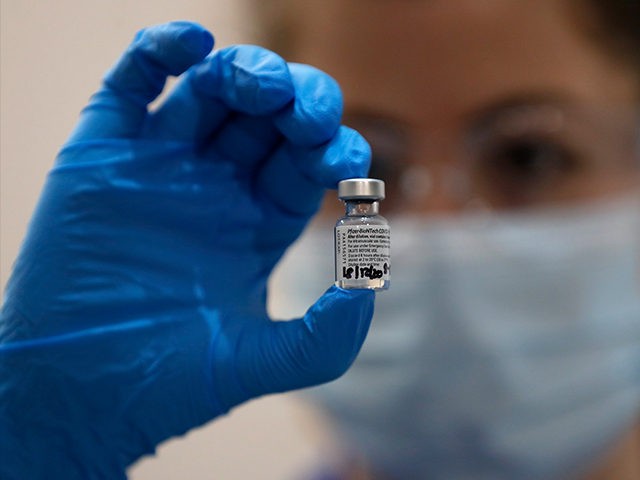Bahrain health officials are encouraging a “booster” shot of Pfizer’s Chinese coronavirus vaccine for people who have already received a full dosage of the Chinese-made Sinopharm alternative, the Associated Press (AP) reported on Thursday.
An official smartphone health app run by the Bahraini government “allows those living in Bahrain to register for booster shots of either the Pfizer or the Sinopharm jabs. However, the government now recommends that people over 50, the obese and people with weakened immune systems receive the Pfizer shot regardless of whether they first received Sinopharm,” according to the AP.
The U.S.-based multinational pharmaceutical company Pfizer, along with Germany’s BioNTech, developed the Pfizer vaccine, while the Chinese state-run pharmaceutical company Sinopharm Group Co., Ltd. developed the Sinopharm vaccine. Pfizer’s vaccine utilizes new mRNA technology to impart immunity against the Chinese coronavirus while Sinopharm‘s vaccine uses a more traditional method to immunize its recipient. Both inoculations require two doses.
“The Pfizer shots, a so-called ‘mRNA vaccine,’ contain a piece of genetic code that trains the immune system to recognize the spiked protein on the surface of the virus. The Sinopharm vaccine is an ‘inactivated’ shot made by growing the whole virus in a lab and then killing it,” according to the AP.
Sinopharm’s coronavirus vaccine gained emergency use approval from the World Health Organization last month despite a lack of published clinical data demonstrating its efficacy.
“The vaccine’s main clinical trial involved 40,382 participants in the Middle East, most of them in the United Arab Emirates,” the Wall Street Journal — which first reported on Bahrain’s promotion of a “booster” Pfizer shot — noted on June 2. The newspaper referred to a peer-reviewed study of Sinopharm published by the Journal of the American Medical Association on May 26, which found that Sinopharm demonstrated an efficacy rate of 78 percent against the Chinese coronavirus. The study’s participants consisted “mostly of healthy young men” whose “mean age was 36,” the Journal pointed out on Wednesday.
“[T]he study reported only two cases of severe disease, a statistically insufficient amount, in the placebo group,” according to the newspaper.
“Conclusions about prevention of severe cases cannot be made,” the authors of the Sinopharm study wrote, adding that it “could not address the question of whether the inactivated vaccines prevent against asymptomatic infection.”
Bahrain has recorded a surging number of daily deaths from the Chinese coronavirus recently, following the widespread use of Sinopharm. The country of 1.7 million reported figures showing that, on average, 12 people per million were dying each day from the disease in recent weeks. The death toll means Bahrain’s domestic outbreak of the Chinese coronavirus is “five times more lethal than India’s,” which was believed to be among the worst in the world in recent weeks, according to the Journal.
Bahrain’s startling mortality rate for coronavirus has emerged despite the country having one of the world’s highest per capita inoculation rates against the Chinese coronavirus. Bahrain’s government has used China’s Sinopharm for the majority of inoculations in its coronavirus vaccine drive to date, as it only recently received its doses of Pfizer’s vaccine.

COMMENTS
Please let us know if you're having issues with commenting.